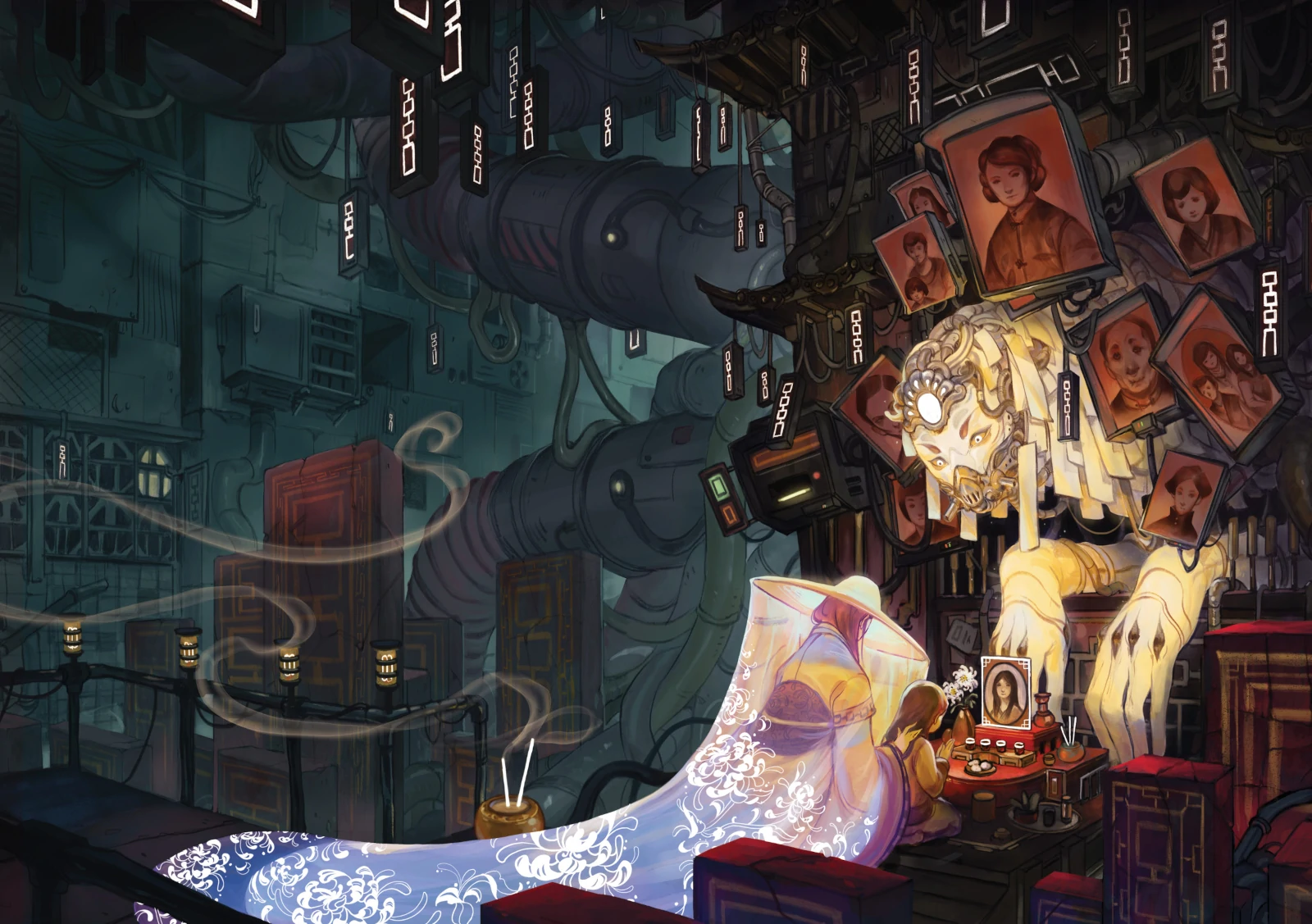
Loose Canons: Adventures in the Literary Multiverse
Words By Karen Brissette, Art By KELLEPICS
In celebration of the recent release of F(r)iction #18: Legacy, we bring you this read-along . . .
In the editor’s note of F(r)iction’s LEGACY issue, editor-in-chief Dani Hedlund asks, “in the end, is our legacy completely out of our control?” Reading further, all signs point to ‘yes.’ The achievements of the individuals featured in Gerald Malone’s piece Blanked from History went uncelebrated because of the social politics of their times, while Dorian Karahalios’ story Old Man Miller depicts how, long after her death, a murdered teenage girl is rebranded from victim to villain, misrepresented to serve a narrative.
After we die, we can’t say with any certainty who will end up with our sweaters, so any conjecture about our own legacy—how we’ll be remembered (or forgotten), or what others will do with what we leave behind, is—at best—a guess thrown into the wind. William Wirt Winchester couldn’t have predicted that his widow Sarah would use his financial legacy to build an ever-changing mansion of secret passageways and staircases leading nowhere as protection against the ghosts of people killed by Winchester rifles any more than Shakespeare could have foreseen that his literary legacy would one day include a version of Hamlet narrated by a fetus.
While legacy preserves the fruits of an author’s labor, adaptations use those fruits as ingredients to make their own preserves; concoctions that alter the flavors of familiar stories by filling in narrative gaps, providing context about why antagonists became who they became, correcting injustices to maligned or underserved characters like Bertha or Miss Havisham, or re-examining stories from alternate POVs or timelines.
Retellings can be great fun, a way for authors to play with other people’s dolls. Seeing how the source material functions within a different time period, location, or culture or tweaking its dynamics by changing characters’ race, gender, or sexual orientation have inspired reimaginings as varied as Jane Austen’s beloved characters facing a zombie invasion, Beowulf in suburbia, or Othello in grade school.
Whether the original authors would approve of these literary staircases built on their legacy-mansions or would instead haunt the folks building them is anyone’s guess—although famously racist H.P. Lovecraft would’ve been horrified by Victor Lavalle’s treatment of his most famously racist book, Homer would probably be cool with Madeline Miller intensifying the implicit bromance between Achilles and Patroclus.
Here are ten adaptations of literary masterpieces for your assessment: are they lode-bearing constructions or ornamental doors to nowhere?
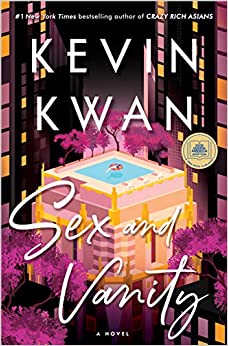
Sex and Vanity
by Kevin Kwan (Doubleday, 2020)
Retelling E.M. Forster’s A Room with a View
From the author of the Crazy Rich Asians trilogy comes a frothy romantic comedy of manners featuring a crazy rich half-Asian woman named Lucie Churchill, for whom being biracial means having to navigate the conflicting expectations, demands, and snobbish sniping from both sides of her Chinese/WASP family tree. A successful art appraiser with a wealthy fiancé, Lucie is living a seemingly charmed life amongst New York’s mega-rich elite when the handsome and vexing George Zao—whom she’d met, detested, and kissed five years earlier—comes back into her life, reigniting old feelings. Their meet-cute, at a wedding in Capri, involved him offering to swap lodgings with her so she could have…wait for it…a room with a view. Yesiree, this modern rom-com romp is a flashy reboot of E.M. Forster’s novel about love, class, and repression in Edwardian England given a new culture-clash twist.
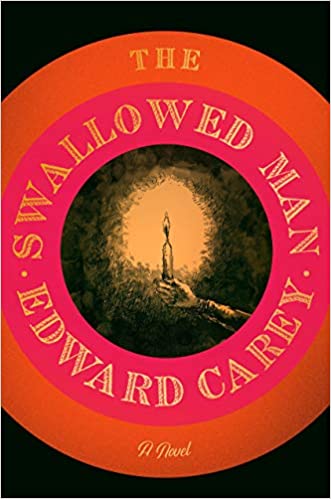
The Swallowed Man
by Edward Carey (Riverhead, 2021)
Retelling Carlo Collodi’s Pinocchio
Charlotte Brontë never explained how Heathcliff got rich during his three years away from Wuthering Heights; a narrative lacuna into which multiple authors have planted their speculative novel flags. But until now, none had imagined what Pinocchio‘s Geppetto was doing whilst trapped in the belly of The Terrible Dogfish* that swallowed him during his search for the wayward puppet-son who ran off after an argument. This book is Geppetto’s diary, written (and illustrated) by candlelight in the belly of a ship in the belly of a beast; the words of a lonely artist reflecting on his life: fatherhood, aging and creation. He goes a little mad in the relentless solitude, staving off loneliness by drawing pictures of Pinocchio, sculpting new companions, and—briefly—befriending a crab.
* NOT Monstro the whale from the same Disney film that redacted Pinocchio killing the talking cricket with a hammer and Geppetto imprisoned for child abuse.
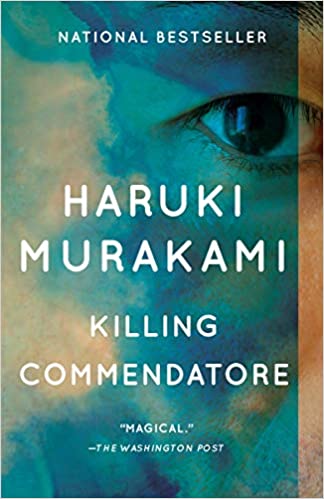
Killing Commendatore
by Haruki Murakami (Knopf, 2018)
Retelling F. Scott Fitzgerald’s The Great Gatsby
Having completed the first-ever Japanese translation of The Great Gatsby, the next logical step for Fitzgerald-superfan Murakami was to retell the tragic story of loneliness and obsession from a different angle. First, he relocated the story from a glitzy Long Island mansion to the remote mountains of Japan. Next, he changed . . . nearly everything else. 500 pages longer than the original, this is Gatsby strained through Murakami’s signature magical realism filter and then shoved through the looking glass repeatedly. The Gatsby scaffolding is the relationship between the unnamed protagonist and his wealthy, enigmatic neighbor, but it’s supporting a reference-laden, Gothic/metaphysical meditation on art, music, war, the creative process, and enlightenment, sprinkled with literary cameos, paintings come to life, a trip to the underworld, and the personification of literary devices. Oh, and Fitzgerald’s symbolic green light is represented by a bell here, which is a real game-changer.
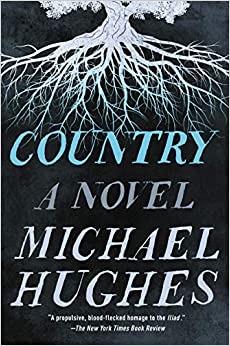
Country
by Michael Hughes (Custom House, 2019)
Retelling Homer’s The Iliad
Adaptations build new worlds around familiar stories to show how society has changed—or hasn’t—in the years between the tellings. This novel is a perfect example of how, when it comes to the business of war, “there is no new thing under the sun.” Hughes recontextualizes the events of The Iliad by setting them in 1990s Northern Ireland during a ceasefire between the IRA and Britain towards the end of the Troubles. Retaining the cadence of the original, with slightly modified names and divine roles recast with mortal characters, this is a surprisingly faithful retelling of Homer’s epic poem about the Trojan War; one conflict sliding easily into another. It’s very butch and visceral; men and guns and violence and blood, and while it may not feature the diversity of . . . every other recently published Homeric rework, it is an unquestionably fine achievement in both historical fiction and literary adaptation.
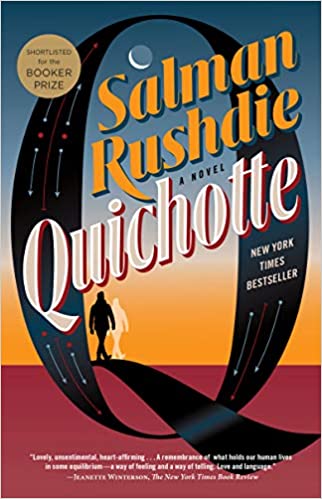
Quichotte
by Salman Rushdie (Random House, 2019)
Retelling Cervantes’ Don Quixote
Cervantes haaaaaated the first adaptation of Don Quixote. Like some 17th century George R.R. Martin, he took ten years off to write the second half of his epic, during which time an unauthorized, anonymous (or pseudonymous) sequel emerged, taking personal shots at Cervantes, who bitterly clapped back at the unknown author in DQ Part II. Rushdie’s homage is less antagonistic, modernizing the original while respecting its bones (a complexly structured picaresque adventure with metafictional flourishes), meat (the Indian-American Quichotte taking a road trip towards an impossible love “accompanied” by his imaginary son Sancho), and spirit (satirizing the popular culture and contemporary values of the times). Cervantes’ story of a man driven mad when his devotion to chivalric romances blurs his perception of reality and fantasy may seem quaint, but Rushdie’s update—Quichotte driven mad by reality TV’s blurring of news and entertainment—is a sobering reflection of the modern condition.
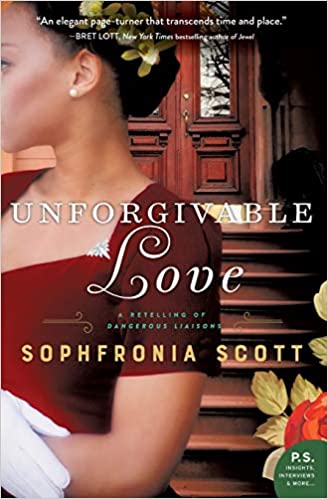
Unforgivable Love
by Sophfronia Scott (William Morrow, 2017)
Retelling Pierre Choderlos de Laclos’ Les Liaisons dangereuses
If you only know Les Liaisons dangereuses via the glossy-magazine film Cruel Intentions, you’ll think it’s about a couple of horny socialites ruining people’s reputations out of boredom. It’s legit entertaining, but it cuts motivation-corners by ignoring the fact that the whole thematic raison d’être driving LLd is power imbalance. As an aristocrat, the Marquise de Merteuil had social status but was denied power because of her gender. Behind her cultivated guise of demure gentility, she manipulated Valmont by weaponizing her sexual currency, strategically deploying him onto a path of destructive seduction to get what she wanted. Scott doubles down on this—set in Jazz Age Harlem, her Mae Malveaux is not only a woman, but a woman of color whose wealth affords her certain freedoms and elite status within Harlem’s social hierarchy, but there are external, systemic forces beyond her control * preventing her from achieving her goals. Machinations ensue.
*wink
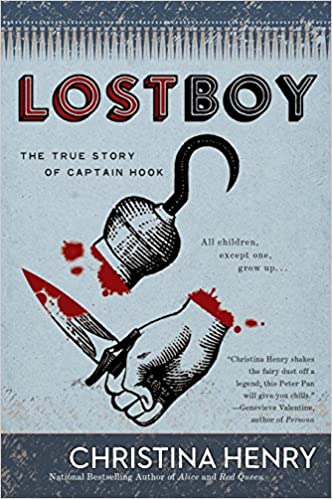
Lost Boy: The True Story of Captain Hook
by Christina Henry (Berkley Books, 2017)
Retelling J.M. Barrie’s Peter Pan
A character-redemption tale positing that Captain Hook was not a villain, but a whistleblower passionate about child advocacy. Here, the notorious Peter Pan nemesis reveals that he was once just a lonely little boy named Jamie; the first Lost Boy to follow Peter through to Neverland, where they remained the very best of friends until Jamie started feeling a little conflicted about Peter’s penchant for luring young boys away from their families with promises of fun and adventure, no rules or adults and never growing up. Because never growing up doesn’t necessarily mean living forever. Sometimes it means dying young and being replaced by another batch of abducted boys. With an immortal’s disregard of mortal limitations, and a forever-child’s lack of responsibility or consequences, Peter is careless with his playthings, and after a while, Jamie gets tired of burying little boys and has to put his foot down.
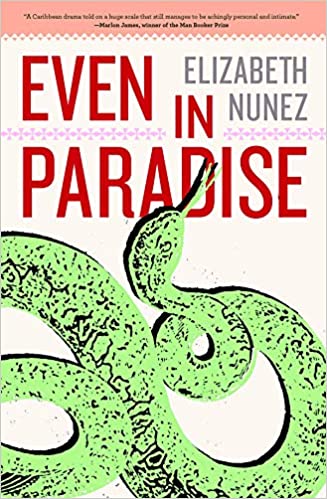
Even in Paradise
by Elizabeth Nunez (Akashic Books, 2016)
Retelling William Shakespeare’s King Lear
Some literary adaptations are meant to operate as correctives; overwriting and supplanting their problematic predecessors, others are tangential “yes but” responses acknowledging the original and offering an alternate perspective. This one’s more like an echo. Set in present-day Trinidad, Barbados, and Jamaica, it’s a multicultural spin on King Lear that co-exists in the world with King Lear. So when the inheritance drama of wealthy Trinidadian landowner Peter Duckworth and his three daughters begins to unfold in uncanny parallel to Shakespeare’s tragedy, narrator and interested party Émile Baxter is familiar enough with the play to comment on the situation’s similarities, but unable to prevent the inevitable fallout of life mirroring art. Lear is the centerpiece of the novel, with its themes of greed, betrayal, and familial discord, but Nunez surrounds her family drama with lush descriptions of its Caribbean location and additional complications of race, class, poverty, and colonialism.
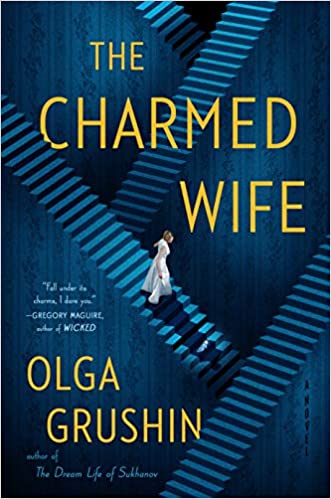
The Charmed Wife
by Olga Grushin (Putnam, 2021)
Retelling Charles Perrault’s Cinderella
We were assured that Cinderella and her Prince lived happily ever after, but a mere thirteen years later, this wellness check of a novel finds her a frazzled queen, beseeching the witch and her fairy godmother for a spell to kill her man. How could a relationship based on a shoe size and a one-night ball possibly turn sour? The realities of marriage, motherhood, and life’s myriad stressors have chipped away at the fairytale’s promise, but this isn’t your typical feminist fairytale retelling; it isn’t a retelling at all, but a prismatic piece of experimental fiction that explodes the rules and conventions of both fairytales and narrative storytelling itself, breaking down the walls between fantasy and reality, looping in characters from neighboring stories and the adventures of talking mice, where ‘good’ and ‘wicked’ are rarely what they seem and happily ever after can only begin once the fantasy ends.
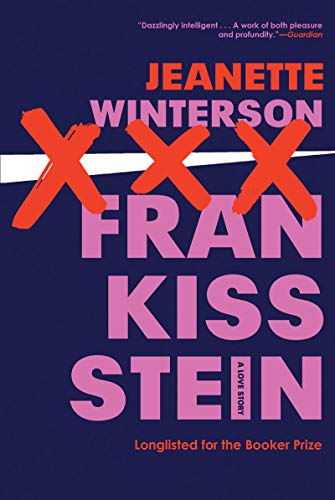
Frankissstein: A Love Story
by Jeanette Winterson (Grove Press, 2019)
Retelling Mary Shelley’s Frankenstein
All adaptations are Frankensteins: new ideas stitched onto old bodies, but Jeanette Winterson frankensteins Frankenstein itself into a very modern Prometheus indeed, which revisits and updates the question of what can be done with a body. Split between that 1816 Lake Geneva summer when Mary conceived Frankenstein, hands-down winning the competition between herself, boy-Shelley, Byron, and Polidori, and a present-day storyline featuring doppelgänger versions of that Swiss family writer’s circle, in which Ron Lord sells sentient sex-dolls and Mary is transfigured as trans man Ry whose lover Dr. Victor Stein is a TED-talking AI expert with visions of transhumanism dancing in his head. The novel has as many moving parts as Shelley’s monster, but its central preoccupation is the body: characters transcending its limitations, pushing past boundaries, imagining the what’s-next possibilities—why settle for your birth body, a human body, or a physical body at all?